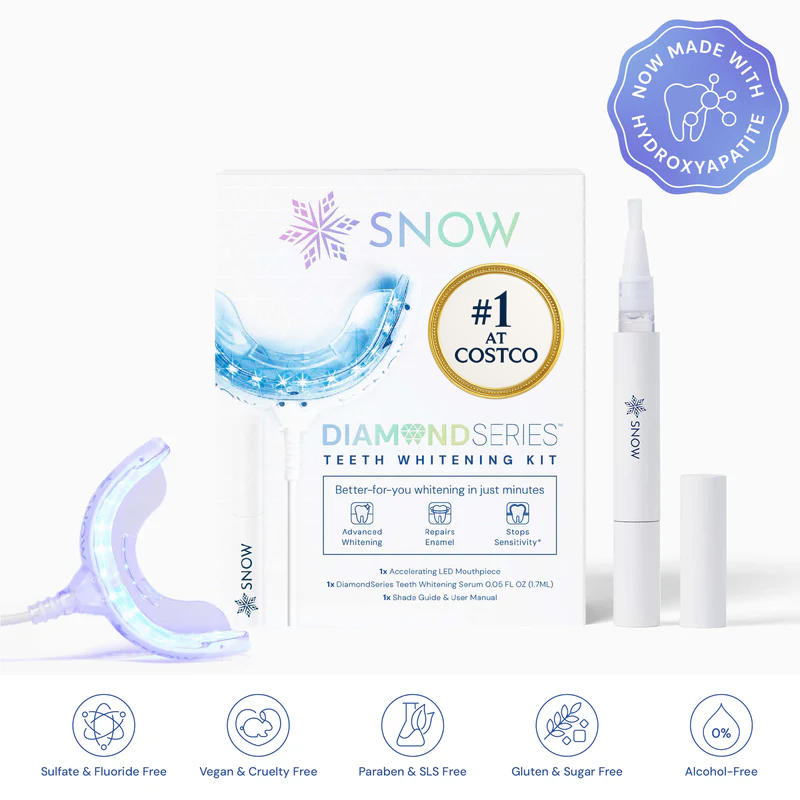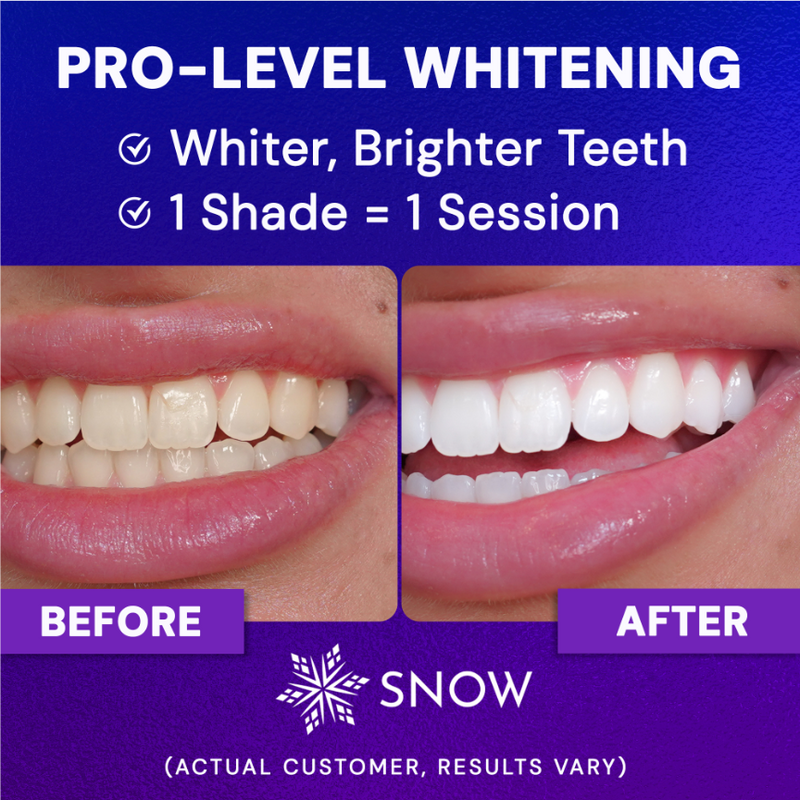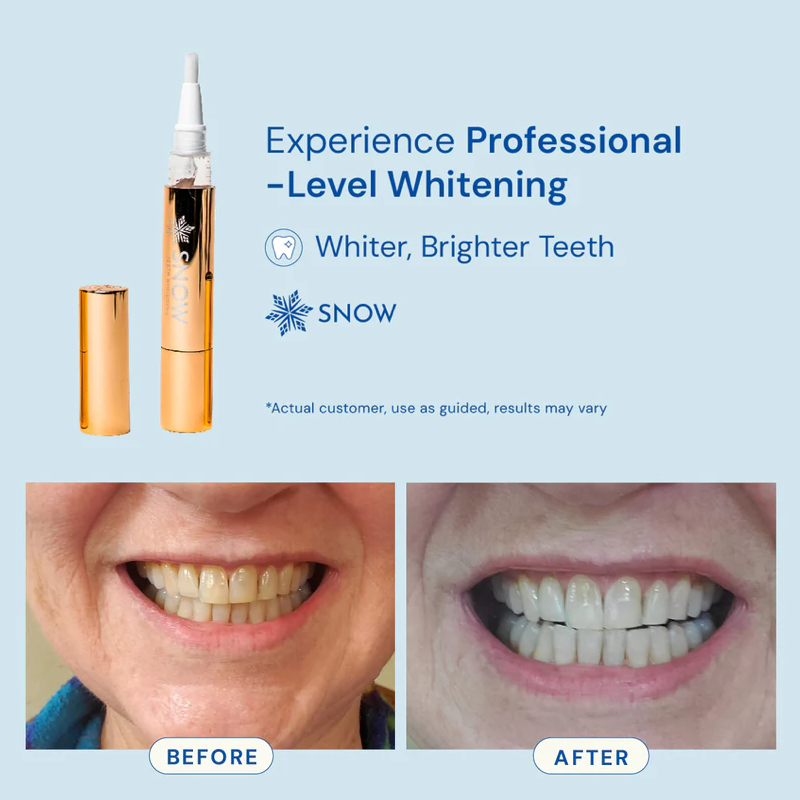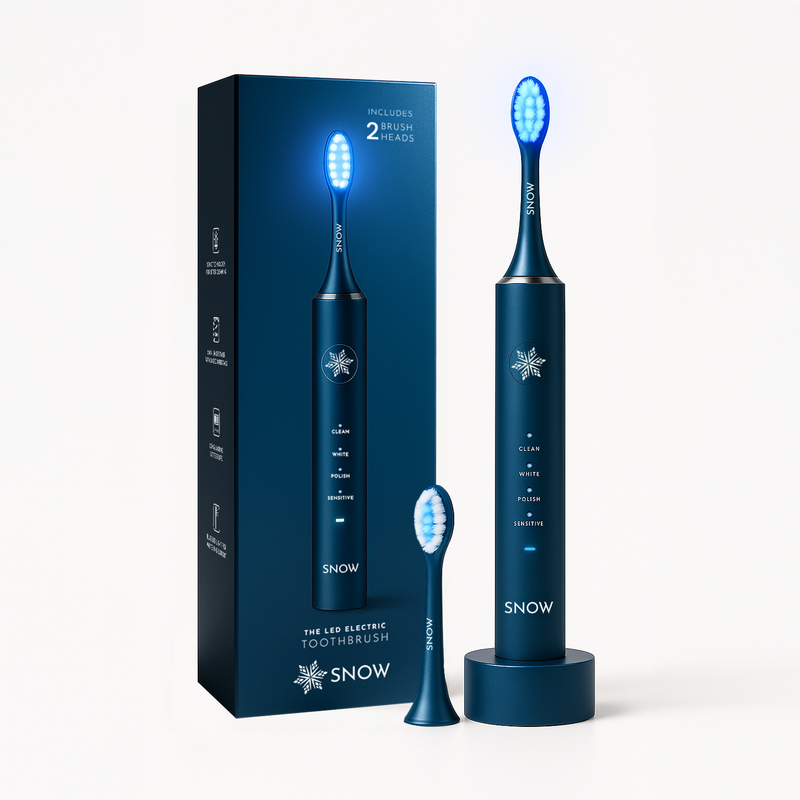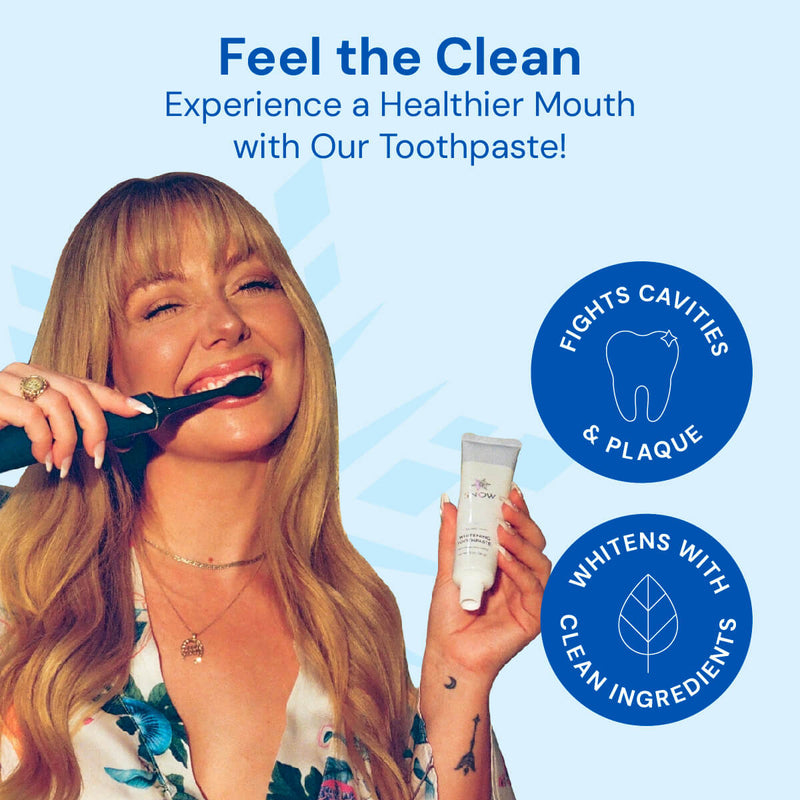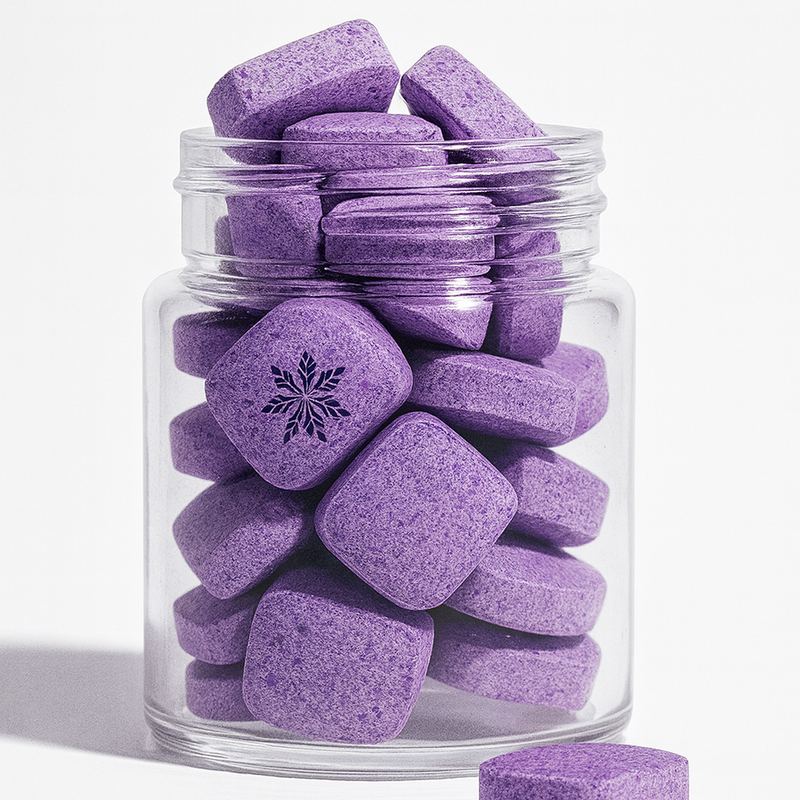Remineralizing toothpaste is designed to restore essential minerals to tooth enamel, helping to reverse early signs of enamel erosion and protect against tooth decay. Unlike regular toothpaste, it goes beyond cleaning—it's focused on strengthening tooth enamel and supporting long-term oral health.
Whether you're dealing with sensitive teeth or simply looking for an enamel repair toothpaste, choosing the right formula can make a big difference. In this guide, we’ll break down what remineralizing toothpaste does, how ingredients like stannous fluoride contribute to enamel protection, and which products in 2025 stand out for daily use.
Key Takeaways
-
Remineralizing toothpaste replenishes essential minerals in tooth enamel, helping to prevent decay and enhance oral health.
-
Key ingredients such as fluoride, nano-hydroxyapatite, and calcium phosphate are critical for the effectiveness of remineralizing toothpastes.
-
Both fluoride and nano-hydroxyapatite are effective alternatives for enamel repair, with the choice depending on individual dental needs and preferences.
Understanding Remineralizing Toothpaste
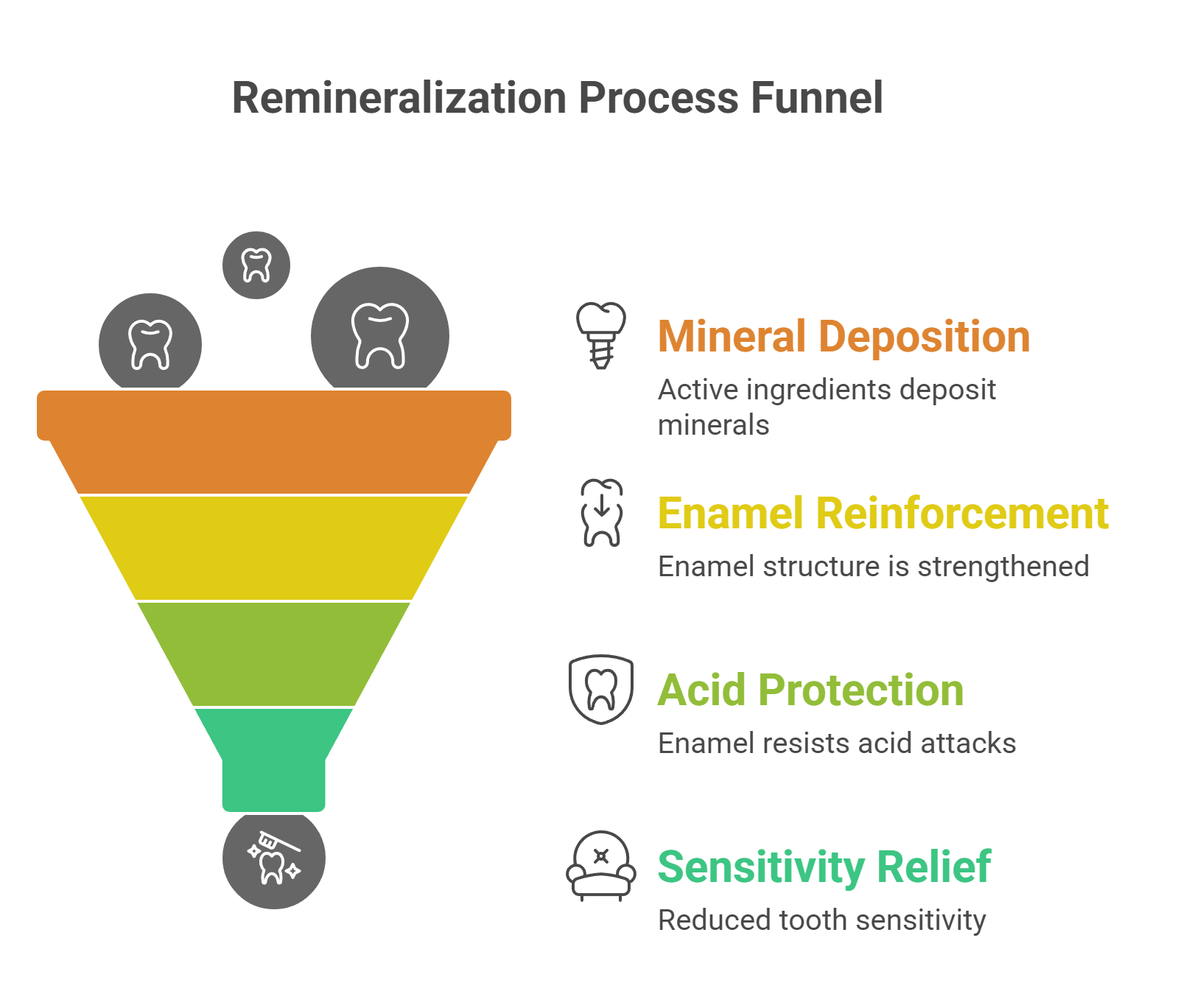
Remineralizing toothpaste is specially formulated to restore lost minerals in tooth enamel, helping reverse mineral loss and protect against cavities, decay, and sensitivity. This process—called remineralization—involves depositing calcium, phosphate, and other active ingredients into enamel to reinforce its structure and make it more resilient to acid attacks from sugary foods, bacteria, and daily wear.
Unlike standard toothpaste, which focuses on surface cleaning and freshening breath, remineralizing formulas directly address demineralization, a process where essential minerals are stripped from the enamel by acidic byproducts of plaque and sugar. Over time, this weakens the enamel, increases sensitivity, and raises the risk of developing white spots, weak spots, and eventually cavities.
What sets these toothpaste options apart is their use of proven remineralization agents, such as fluoride, nano-hydroxyapatite, and occasionally calcium carbonate. These ingredients help rebuild mineral content by mimicking or reinforcing the natural composition of enamel. High-quality remineralizing toothpaste enhances remineralization potential and promotes healing even in the early stages of enamel erosion.
To get the most out of your new toothpaste, follow these essential good oral hygiene habits:
-
Brushing gently for at least two minutes, twice a day.
-
Use circular motions to avoid further harming your gums or enamel.
-
Rinse the mouth thoroughly after brushing.
-
Avoiding harsh chemicals or overly abrasive formulas that may erode enamel.
-
Reducing consumption of sugary foods to limit acid buildup and plaque.
-
Staying hydrated to maintain healthy saliva flow, which naturally supports remineralization.
Some options even provide sensitivity relief for sensitive teeth, making daily care more comfortable. While fluoride remains the most widely used, those avoiding it may opt for toothpaste with alternative remineralization agents.
Whether you're looking to repair further damage, reduce white spots, or simply support your overall oral health, choosing the right toothpaste with the correct minerals can make a big difference. For best results, consult your dentist to determine which formula suits your teeth, lifestyle, and body needs best.
Key Ingredients in Remineralizing Toothpaste
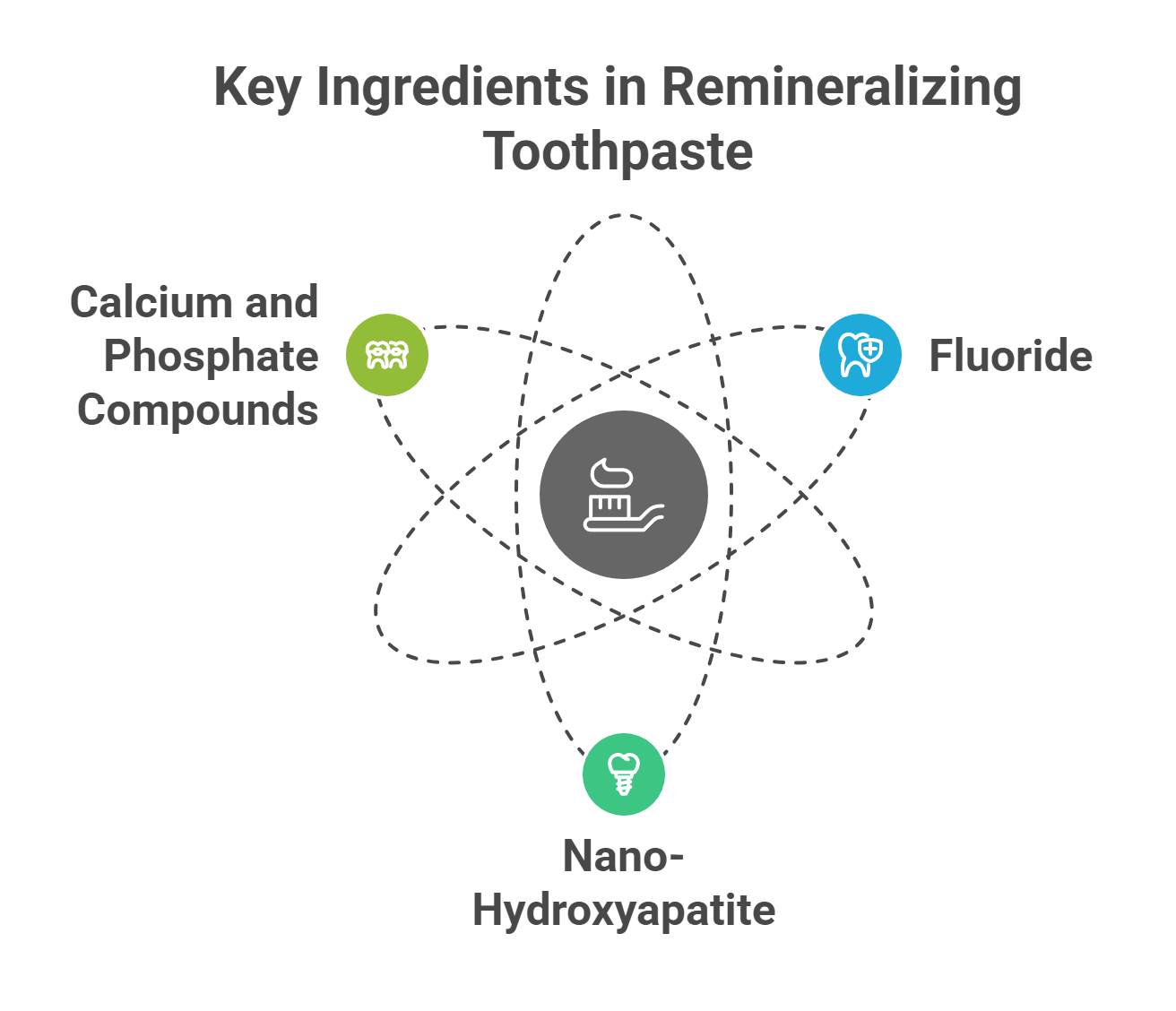
Remineralizing toothpaste’s effectiveness hinges on its key ingredients, which strengthen teeth and prevent decay. Common remineralization agents include:
Fluoride
Fluoride is a well-known and widely used ingredient in remineralizing toothpastes. It helps reduce the solubility of enamel, thus preventing decay. Its benefits include:
-
Promoting the formation of fluorapatite-like minerals, which enhance remineralization under low pH conditions and reduce demineralization
-
Increasing salivary fluoride concentration and plaque fluoride retention when using high-fluoride toothpaste
-
Being highly effective for both children and adults in controlling early lesions
In pediatric studies, fluoride-based agents like BioMin F have demonstrated a higher antibacterial effect against Streptococcus mutans compared to other remineralizing agents. This makes fluoride toothpaste an excellent choice for cavity prevention in children.
For adults, fluoride toothpaste continues to be a reliable option for maintaining oral health and preventing enamel caries.
Nano-Hydroxyapatite (nHA)
Nano-hydroxyapatite (nHA) is a synthetic form of hydroxyapatite that is highly effective in bonding to enamel surfaces and aiding in the repair of microscopic imperfections. Due to its nano-sized particles, nHA can effectively bond to proteins and bacteria, enhancing its cleaning and repairing capabilities. This makes it a powerful ingredient for strengthening tooth enamel and promoting overall oral health.
Research indicates that nHA can directly replace lost minerals or act as a carrier for lost mineral ions, effectively remineralizing the organic scaffold in carious teeth. For patients avoiding fluoride, nano-hydroxyapatite toothpastes offer a plausible alternative with growing clinical evidence.
The ability of nHA to fill enamel defects and deposit apatite nanoparticles makes it highly effective in caries prevention and enamel repair.
Calcium and Phosphate Compounds
Calcium and phosphate compounds play a vital role in the natural remineralization of tooth enamel, aiding its repair process. These compounds work together to:
-
Create a supersaturated environment in saliva, promoting enamel remineralization.
-
Phosphate ions enhance the remineralization process by working alongside calcium ions.
-
Strengthen enamel and maintain dental health.
A lack of adequate calcium deficiency can lead to deterioration in enamel quality. Functionalized tricalcium phosphate (TCP) in toothpaste helps promote optimal interaction between calcium and fluoride, enhancing the overall effectiveness of the remineralization process.
By incorporating these compounds into remineralizing toothpaste, manufacturers can offer products that effectively repair and protect tooth enamel and support the natural repair process with synthetic foaming agents.
Comparative Analysis: Fluoride vs. Nano-Hydroxyapatite
Both fluoride and nano-hydroxyapatite (nHA) are powerful ingredients used in remineralizing toothpaste, but they work differently and offer unique benefits depending on your dental needs.
Fluoride has long been the gold standard in dental care. It strengthens the outer surface of enamel lesions by forming fluorapatite, a more acid-resistant mineral that helps prevent future tooth decay. It's especially effective at halting early-stage cavities and is widely recommended by dental professionals.
In contrast, nano-hydroxyapatite, a synthetic form of the natural mineral found in enamel, works more comprehensively. It bonds to the tooth and helps repair enamel at a deeper level, promoting uniform remineralization across the entire lesion—not just the surface. This makes nHA an excellent choice for those with sensitive teeth or who prefer a fluoride-free option.
Clinical research supports both ingredients. Studies show that fluoride and nHA toothpastes can reduce early cavities by over 50%. In children, hydroxyapatite performed just as well as fluoride in preventing dental caries (as measured by DMFS scores). In adults, nHA was found to be equally effective in protecting against further enamel damage.
While fluoride remains a trusted, well-established solution, nano-hydroxyapatite is gaining popularity for its biocompatibility and deeper restorative properties. Some evidence even suggests that using both together may deliver enhanced results.
Ultimately, the best choice comes down to your personal preferences, health needs, and professional advice from your dentist. Whether you're looking for a traditional solution or exploring newer science-backed alternatives, both fluoride and nHA offer strong benefits for strengthening tooth enamel.
Here’s a quick comparison table to help you understand the key differences between fluoride and nano-hydroxyapatite (nHA) in remineralizing toothpaste:

Top Remineralizing Toothpastes of 2025
As dental care continues to evolve, several remineralizing toothpastes stand out for their effectiveness in strengthening tooth enamel and preventing cavities and decay.
Here are the top best remineralizing toothpaste options for 2025, each offering unique benefits to cater to different needs and preferences.
1. SNOW Purple Brightening Magic Whitening Toothpaste Booster® Powder
This fluoride-free booster powder is infused with nano-hydroxyapatite and xylitol, offering a dual benefit of instant whitening and enamel remineralization. Designed to work with any toothpaste, it uses color-correcting technology to neutralize yellow tones and brighten teeth immediately.
Originally studied by NASA and used in Japan for decades, hydroxyapatite supports enamel repair and sensitivity relief—making it a standout choice for those wanting visible results without harsh ingredients.
2. Sensodyne Pronamel Mineral Boost
Sensodyne Pronamel Mineral Boost offers excellent anti-erosion protection, making it crucial for maintaining strong tooth enamel. This toothpaste is specially designed for individuals with sensitive teeth, helping to protect enamel from erosion while providing relief from tooth sensitivity.
Its formulation ensures that users can enjoy both remineralization and sensitivity relief, making it an ideal choice for those with sensitive teeth.
3. Boka Ela Mint Toothpaste
Boka Ela Mint Toothpaste is a fluoride-free option that combines natural ingredients to promote oral health. This toothpaste is formulated with gentle, natural ingredients, making it a beneficial option for individuals with sensitivities.
The absence of fluoride caters to those seeking a more natural approach to dental care while still ensuring effective remineralization and protection against enamel caries.
4. Colgate Renewal Enamel Fortify
Colgate Renewal Enamel Fortify is formulated to restore enamel and provide anti-gingivitis benefits. Its dual action formula not only repairs weakened enamel but also fights gum disease, making it a comprehensive option for oral care that supports healthy gums.
The combination of enamel repair and anti-gingivitis properties ensures that users can address multiple dental concerns with a single enamel repair toothpaste.
5. Crest Pro-Health Advanced Enamel Repair
Crest Pro-Health Advanced Enamel Repair offers multiple oral health benefits, including gum health support, enamel strengthening, and relief from sensitivity. Its advanced formula promotes remineralization, making teeth stronger over time and providing effective enamel repair.
For those seeking a comprehensive solution for oral health, this new toothpaste stands out as a top choice for maintaining a healthy mouth.
6. RiseWell Mineral Toothpaste
RiseWell Mineral Toothpaste is popular for its formulation that avoids synthetic agents and is suitable for both children and adults. The toothpaste’s synthetic-free formulation appeals to consumers looking for natural oral care options, ensuring effective remineralization without the use of synthetic agents.
Its versatility makes it a great option for families looking for a single toothpaste that can cater to all ages.
Clinical Outcomes in Children and Adults
Clinical studies have shown that both fluoride and nano-hydroxyapatite (nHA) toothpastes are effective in reducing dental caries and enhancing enamel strength in both children and adults. Fluoride toothpaste, in particular, has been found to enhance both remineralization and protection against enamel demineralization, making it a reliable choice for cavity prevention. Incorporating remineralizing toothpaste with other preventive approaches can further enhance its effectiveness.
A systematic review and meta-analysis revealed that hydroxyapatite (HAP) toothpastes were significantly better for caries prevention compared to placebo toothpastes. Outcome measures from the clinical trials included caries incidence, recorded as dmft(s)/DMFT(S) or using ICDAS criteria.
These findings highlight the effectiveness of HAP toothpaste in reducing lesion depth and improving enamel microhardness, making it a promising alternative to fluoride-based toothpastes.
Pediatric Studies
Research indicates the following about toothpaste effectiveness in children:
-
Toothpaste containing Biomin F effectively promotes enamel remineralization in children with initial caries.
-
HAP toothpastes are effective in preventing caries and can be considered a good alternative to fluoride.
-
A pediatric comparative study suggests Biomin F is superior to conventional fluoride in children, highlighting its effectiveness in promoting healthy enamel.
A triple-arm pediatric randomized controlled trial suggests hydroxyapatite-fluoride toothpastes led to significantly more inactive enamel lesions compared to monofluorophosphate controls. These findings underscore the potential of HAP toothpastes in providing superior caries prevention and enamel repair in children, making them a valuable option for pediatric dental care.
Adult Studies
In adults, fluorinated agents have been found to be more effective in remineralizing artificially induced white spots lesions than non-fluoride remineralizing agents. The results favored HAP toothpaste when compared with fluoride toothpaste, but the differences were non-significant, indicating that both options are effective for caries prevention.
Nano-hydroxyapatite (nHA) has been shown to effectively lessen the duration of tooth sensitivity in people who use teeth whiteners. Remineralizing toothpaste can also make teeth less susceptible to erosion and discoloration over time, further enhancing its benefits for adult dental care.
High-fluoride toothpaste impacts on salivary fluoride retention and remineralization have been well-documented in prior reviews and trials, highlighting its continued relevance in adult oral health.
Dosing and Concentrations of Remineralizing Agents
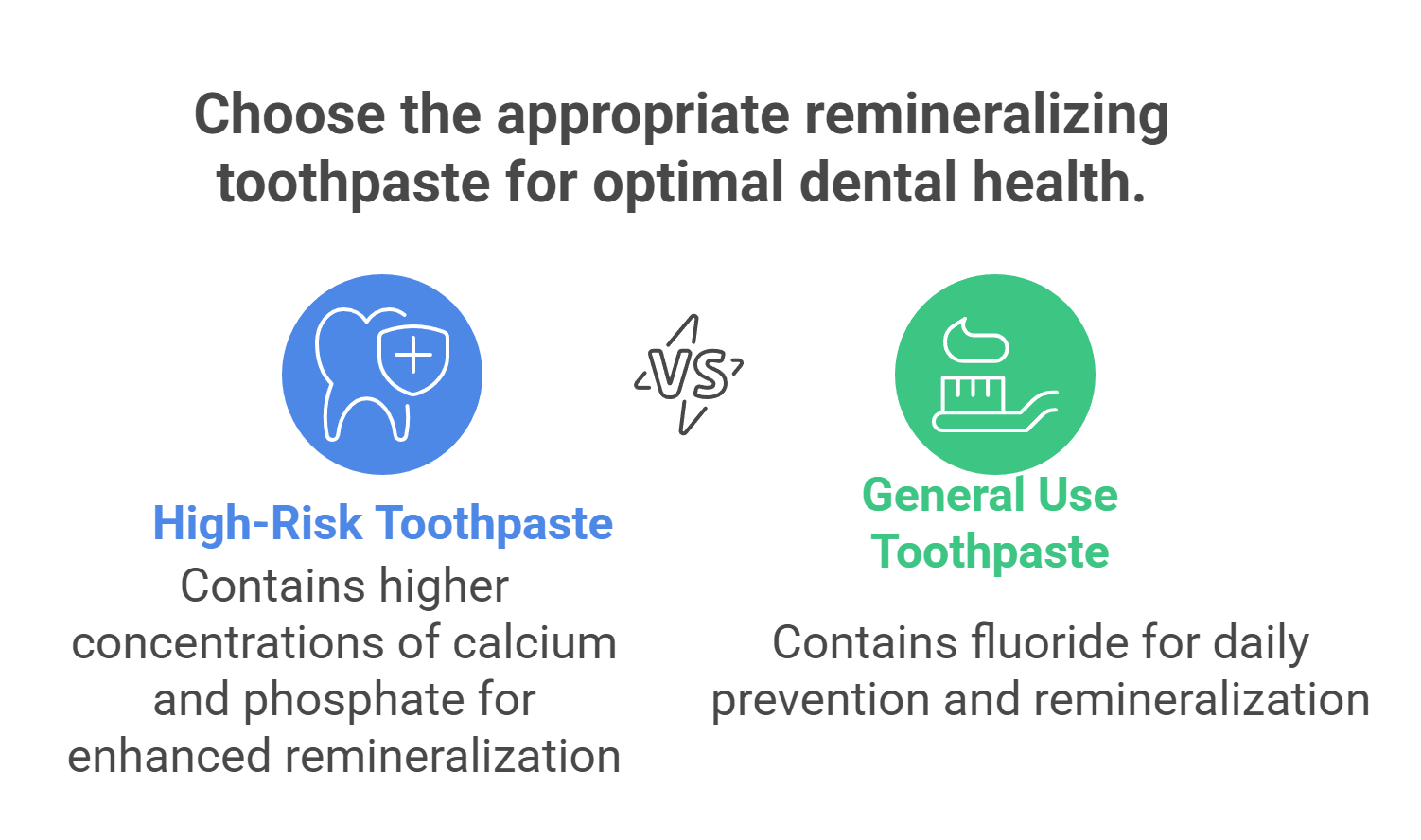
The effectiveness of remineralizing toothpaste is closely tied to the dosing and concentrations of its active ingredients:
-
An optimal calcium to phosphate ratio of 1.6 is ideal for effective enamel remineralization.
-
Dicalcium phosphate dihydrate (DCPD) in toothpaste boosts free calcium ions in the plaque fluid for up to 12 hours after use.
-
This boost promotes sustained remineralization potential.
Fluoride concentrations in toothpaste can vary, with common formulations containing sodium fluoride, sodium monofluorophosphate, and stannous fluoride. Individuals at a high risk of tooth decay, such as adults with a history of caries, may benefit from using remineralizing toothpaste that contains higher concentrations of calcium and phosphate.
For the general population, daily use of fluoride toothpaste around 1000 to 1500 ppm remains a strong strategy for preventing and remineralizing early-stage lesions.
Safety and Use Cases
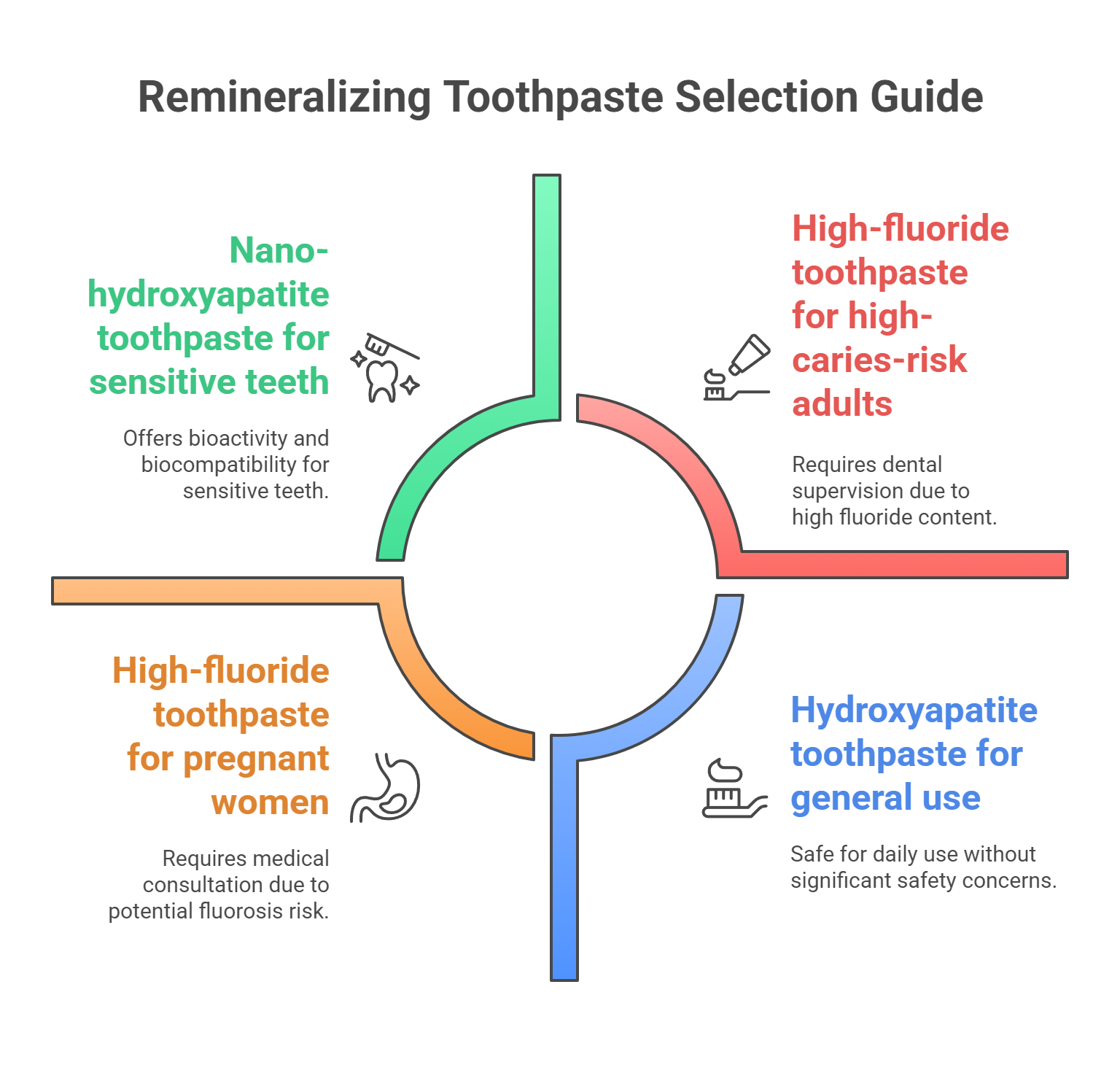
Safety and specific use cases should be considered when selecting a remineralizing toothpaste:
-
Hydroxyapatite permits higher doses without safety concerns.
-
Fluoride has a limit to prevent fluorosis.
-
Nano-hydroxyapatite is noted for its bioactivity and biocompatibility.
-
Nano-hydroxyapatite is a promising fluoride alternative, especially for higher dosage applications.
However, consultation with a healthcare provider is recommended for pregnant or breastfeeding women and children before using specific formulations.
Daily Use Safety
Although daily use of remineralizing toothpaste is generally safe for most adults, specific populations should exercise caution. Pregnant or breastfeeding women should consult their doctor before using high-fluoride formulations like 3M Clinpro 5000.
Similarly, children should not use high-fluoride toothpaste without approval from a healthcare provider to avoid potential risks.
Specific Use Cases
Individuals with damaged or weakened enamel may find improved tooth health and comfort by using remineralizing toothpaste. Products designed for sensitive teeth often contain remineralizing agents that help alleviate discomfort by reinforcing enamel.
People experiencing tooth sensitivity may find specific formulations of remineralizing toothpaste helpful in alleviating their discomfort, providing relief and strengthening enamel simultaneously. High-caries-risk adults might consider 5000 ppm fluoride toothpaste under dental supervision for optimal protection.
How to Choose the Right Remineralizing Toothpaste
Selecting the right remineralizing toothpaste requires checking the following:
-
Ingredients list for minerals like nano-hydroxyapatite (nHAP) and calcium phosphate
-
Reputable brands that are transparent about ingredients and manufacturing locations
-
Inactive ingredients that could be potential allergens, such as certain flavorings
Key points about toothpaste recommendations and the ADA seal:
-
A dentist may recommend prescription remineralizing toothpaste tailored to specific oral health needs.
-
The ADA seal on toothpaste indicates that it meets established standards for safety and effectiveness.
-
If a toothpaste does not have the ADA seal, seek advice from a dentist or the company regarding its formulation.
Personalized formulas may emerge in the future based on individual enamel needs assessed through advanced diagnostics. Avoid products that make unrealistic claims about rebuilding enamel, as these can be misleading.
Final Thoughts
Remineralizing toothpastes offer a powerful solution for strengthening tooth enamel and preventing decay. Key ingredients like fluoride, nano-hydroxyapatite, and calcium and phosphate compounds play crucial roles in the remineralization process. Understanding the differences between these ingredients can help you choose the best product for your needs.
The top remineralizing toothpastes of 2025, including Sensodyne Pronamel Mineral Boost, Boka Ela Mint Toothpaste, Colgate Renewal Enamel Fortify, Crest Pro-Health Advanced Enamel Repair, and RiseWell Mineral Toothpaste, provide a range of options to address various dental concerns. With proper use and guidance from a dentist, these products can significantly improve oral health and protect against future damage. Embrace the power of remineralizing toothpaste and enjoy a healthier, brighter smile.
Frequently Asked Questions
What is remineralizing toothpaste, and how does it work?
Remineralizing toothpaste replenishes essential minerals in tooth enamel to counteract demineralization from dietary acids. It strengthens teeth and repairs weak areas by depositing minerals back into the outer layer.
What are the key ingredients in remineralizing toothpaste?
The key ingredients in remineralizing toothpaste are fluoride, nano-hydroxyapatite (nHA), and various calcium and phosphate compounds, all of which work together to repair and protect tooth enamel effectively.
How do fluoride and nano-hydroxyapatite compare in effectiveness?
Fluoride and nano-hydroxyapatite are both effective for remineralization, but nHA provides a more uniform treatment throughout the lesion, while fluoride targets the outer surface. Therefore, for comprehensive remineralization, nano-hydroxyapatite may offer advantages over fluoride.
Are there any safety concerns with using remineralizing toothpaste daily?
Using remineralizing toothpaste daily is safe for most adults, but it is advisable for pregnant or breastfeeding women and children to consult a healthcare provider before using high-fluoride options.
How can I choose the right remineralizing toothpaste for my needs?
To select the right remineralizing toothpaste, prioritize those containing nHAP or calcium phosphate, and ensure they have the ADA seal. Consulting your dentist can further guide you to the best option for your specific dental needs.














































